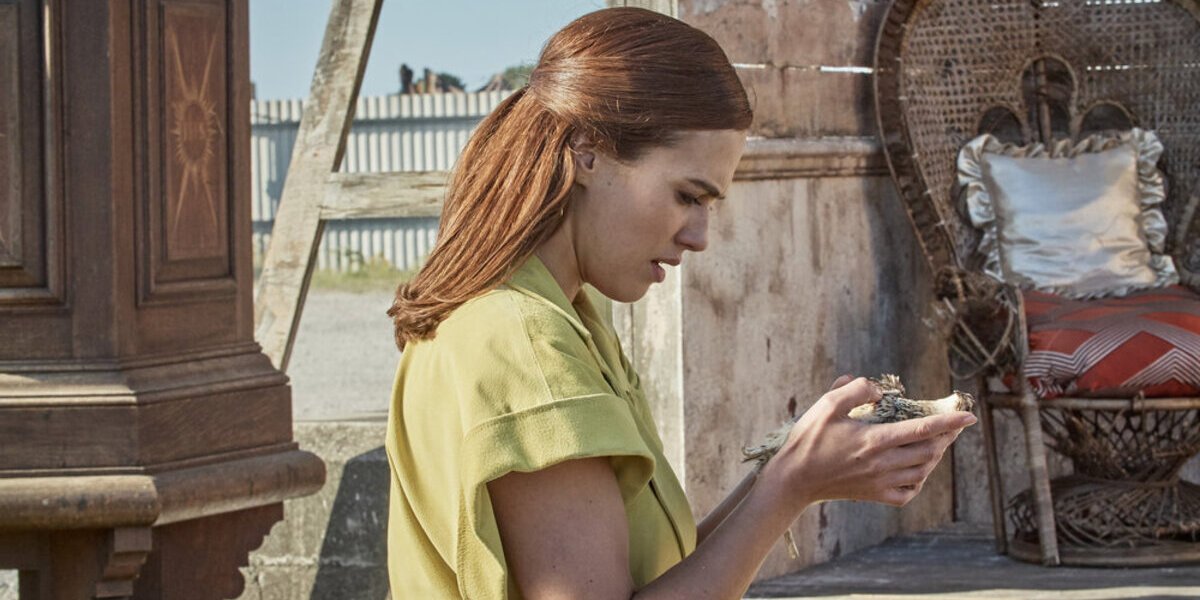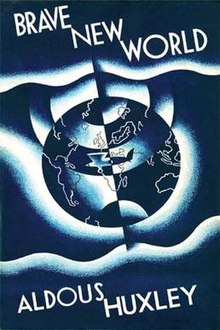As Brave New World is, along with 1984, the most referenced and widely read of the 20th century dystopian novels, and certain of its ideas about the potential for a technocratic, science and pharmaceutical-dominated future society obviously have resonance with regard to contemporary developments, I thought I should make a more elaborate post about it than what I usually do. But after a couple of weeks of trying to come up with some pertinent idea about it, I have to admit that I don't have anything and just leave what I took for notes. While it is a very famous book, and at times an interesting and amusing book, it is not, even compared with the other books on this list, a major book, and never quite feels like it is particularly important even in the way that something like Alice in Wonderland does. Huxley was a genuinely smart man, and one of the more effective critics, not only here but in his other works as well, of science and technology-worship that I have come across, but the impression I get from all his novels (I think I've read three of them anyway) is that of extended thought-exercises which never quite achieve enough of an artistic form to enable them to make a more powerful emotional impact. This novel felt like once he laid out the general premise he floundered a bit narratively, and especially did not have a strong sense of how to end it. The Savage's constant quoting of and reference to Shakespeare is probably a little heavy-handed, but I get that it is trying to get across an effect that is important to such story as there is, and I trust that Huxley really knew his Shakespeare about as well and naturally as anyone in the last 100 years and was saying something legitimate about it so I don't mind it that much.
As one of the relatively few popular works on the IWE list that is still widely referenced today, it is perhaps worth looking into what their perspective was with regard to it circa 1960.
"Miranda said it...'How beauteous mankind is! O brave new world, that has such people in it!' She was speaking ironically, so her words were an apt title for Huxley's satirical Utopia. In a 1946 Foreward (sic) for a new printing, Huxley apologizes for not foreseeing the atomic age (as he might have; Wells did, before the turn of the century). But no one ever said Brave New World is good science fiction. It is enough to be good satire."
Was Miranda speaking ironically? What did Wells foresee? The spectre of atomic destruction seems to loom less in our lives than perhaps it should. People on Twitter are up in arms about many things, but no one ever talks about that.
So that just leaves my paltry notes.
As far as Huxley's picture of the future goes, even less than 90 years out, there are some notable misses. No computers, no mass immigration (England is still more or less populated exclusively by white English people), men still occupy all positions of authority and administration. There appear to be, relative to the adult population, large numbers of children in this society, managed by the state of course, but earlier generations on the whole did not envision a future with the kind of huge decline in birthrates that we have had for a couple of generations now.
p.79 "...turning to his secretary, 'I'll leave you to put my things away,' he went on in the same official and impersonal tone; and, ignoring her lustrous smile, got up and walked briskly to the door." My note at the time reads--Of course no one has ever smiled at me lustrously. But I forget I'd be a gamma in this world anyway--This is perhaps overly self-pitying. It is possible that once or twice in my life I may have received a lustrous smile that would actually have been pleasing to me, though I was too obtuse to pick up on it at the time. Also I would probably even in a purely eugenically engineered world such as this have enough brains to make it to a beta level. Gammas don't seem to be smart enough to be self-aware of their intellectual shortcomings, which may be to their advantage in some ways.
People really could not imagine a future without newspapers (Heinlein always has them in his books too). Also telephones, and going out to public theaters and gatherings for entertainment, which even before the Pandemic had increasingly been becoming something of a niche activity (I capitalize Pandemic because my daughter asked me last week what was the difference between a Pandemic and an Epidemic and while I gave what I think was a plausible answer I had to think it through based on the roots, etc, and I still have been too lazy as yet to look it up).
The elite class in this generation were highly concerned with the need to manage the burgeoning population's day to day life in a technocratic manner to an extent our leaders don't seem to feel much responsibility for doing (other than policing and encouraging consumption, their work/family life/moral development are of little interest).
p.81 "'These women!' And he shook his head, he frowned. 'Too awful,' Bernard hypocritically agreed, wishing, as he spoke the words, that he could have as many girls as Helmholtz did, and with as little trouble." (lol)
Visionaries of the past really thought personal air transport would become much more common than has thus far proven to be the case.
I have to confess, these mandatory community sing-a-longs and meetings with drugged up pneumatic girls is kind of more appealing than whatever social life we have, or are supposed to have, now. (I could have taken part in the election celebrations, I guess, though venerating the likes of Stacey Abrams, etc, though I know it is supposed to be a reward in itself, is not quite the substitute for these evil but somewhat tantalizing orgies one might have hoped for with the new social and technological developments either).
Where are all of the old women in BNW? Is that part of the utopia? No old men either apart from a few directors and scientists. (It is revealed later on in the book that the physical aging process is slowed and managed until euthanization at around age 60)
p. 267 I thought the Cyprus experiment (clearing out the population of that island and giving it over exclusively to alphas, who proceeded to devote themselves to battling over status and position, ending in a violent civil war) might be akin to much about our present social situation.
p. 268 "The optimum population," said Mustapha Mond, "is modelled on the iceberg--eight-ninths below the water line, one-ninth above." It's fashionable in some circles to mock the idea of elite overproduction that I see turning up on the internet quite a bit, but like many ideas that catch on to an extent, there is something in it. It's clear for example, that from the social standpoint, everybody cannot be "educated" even should they advance to some level (i.e. literacy) that would once have qualified them for that designation, hence the fervor verging on desperation in some quarters to castigate entire segments of the population as "uneducated" by association based on political or some other kind of social undesirability. Maybe this is too obvious.
Huxley's society has definitely come to the conclusion that the lower orders need to be kept working, as well as generally managed. Our society seems to be coming around to the second point, but is less invested in the first, perhaps because of the expectation that has been instilled in the population that one should be compensated like a serious adult for anything resembling real work, which notion it is going to take some more time to disabuse the masses of entirely.
The Bourgeois Surrender Challenge
An unusually large number of movies in this one.
1. Ghostbusters (movie-1984)..................................................................................9,438
2. Ender's Game (movie-2013)................................................................................8,236
3. The Terminator (movie-1984)..............................................................................6,492
4. Douglas Adams--The Hitchhiker's Guide to the Galaxy......................................5,352
5. Her (movie-2013).................................................................................................3,440
6. Gaslight (movie-1944).........................................................................................1,730
7. Mary Jordan--The Art of Her Deal.......................................................................1,457
8. The Expanse (TV-2019), Season 1........................................................................1,266
9. Steven Spangler--10-Minute Science Experiments..................................................765
10. Alexis de Toqueville--Democracy in America......................................................345
11. Christa Parravani--Her...........................................................................................274
12. Dodsworth (movie-1936).......................................................................................260
13. Introduction to Learning and Behavior (multiple authors)....................................148
14. Three Early Modern Utopias: Utopia/New Atlantis/The Isle of Pines....................66
15. Kim Stanley Robinson--Mars Trilogy......................................................................45
16. Gregory Floyd--A Grief Unveiled............................................................................24
1st Round
#16 Floyd over #1 Ghostbusters
#15 Robinson over #2 Ender's Game
#14 Modern Utopias over #3 The Terminator
I guess I am going to have to watch these top 3 movies. The rest of them look like they might be all right.
#4 Adams over #13 Introduction to Learning and Behavior
#12 Dodsworth over #5 Her
#11 Parravani over #6 Gaslight
#10 de Toqueville over #7 Jordan
#9 Spangler over #8 The Expanse
I don't think there is anything that controversial here.
Round of 8
#4 Adams over #16 Floyd
#15 Robinson over #9 Spangler
#14 Modern Utopias over #10 de Toqueville
The first real serious matchup of books. One of the three modern utopias (Utopia) is actually on the program anyway. The full de Toqueville is pretty long, and the utopia book has an upset card anyway, so in something of a toss-up it gets the edge.
#11 Parravani over #12 Dodsworth
#15 Robinson over #4 Adams
I have heard about and been aware of the Hitchiker's Guide to the Galaxy for most of my life, but I never really understood what it was. I thought it was just a book, and it is a book, but it's also a series of books, and a comic book, and a TV show, and a movie, and it originally started as a radio comedy, and I realized as I got into the contest that I don't really know which of those media productions I should be using in the Challenge, since the entry that got this into the competition to begin with was a general listing of characters, who appear across all of them. So I felt that I had to disqualify it against the Mars Trilogy, which was more clearly designated as just being the books.
#11 Parravani over #14 Modern Utopias
The Parravani book is a memoir. I don't know how good it is, but the author seems to have some critical and social respectability, and the multi-book/multi-author aspect of the Modern Utopias was making me uncomfortable.
Championship
#15 Robinson over #11 Parravani
The Mars Trilogy, which I actually had never heard of, won a number of major science fiction awards and seems to be considered a classic in that genre, so maybe I should try to read it, though I have had at best mixed reactions when I've tried to read famous authors of this type (Heinlein, Philip Jose Farmer, even Huxley to some extent) in the past.
I am very tired this month. My brain seems to be completely shot.

















